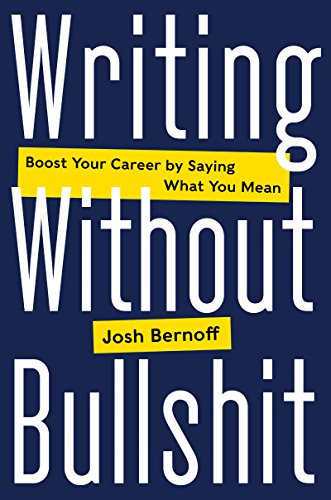
About
Title: Writing Without Bullshit Authors: Josh Bernoff Category:books Number of Highlights: 13 Date: 2024-01-10 Last Highlighted: 2023-10-08
Highlights
Let’s agree on one principle. This principle powers everything else in this book. I call it the Iron Imperative: Treat the reader’s time as more valuable than your own. (288)
Your ideal should be tight writing. Eliminate everything you don’t need. The tighter you write, the more persuasive you will be. As Roy Peter Clark says in his masterful book How to Write Short: Word Craft for Fast Times, “During revision, I realize that 90 percent of my cuts are helpful.” Don’t just trim the fat. Lop off the stuff you liked but that isn’t helping enough. (746)
Tags:writing
the objective is the same: deliver the main idea, up front, in as few words as possible. (886)
“Controlling the sequence in which you present your ideas is the single most important act necessary to clear writing. The clearest sequence is always to give the summarizing idea before you give the individual ideas being summarized.” (888)
Tags:writing
“When you have the urge to write a whole long story, write the summary sentence instead. Write the one thing you want someone to know after reading this, and then back it up. If people know where you’re heading, they’re more willing to read it.” (892)
Often, it’s easier to just use the zombies test: if you can add “by zombies” after the verb and it still makes grammatical sense, it’s passive voice. (“Attention must be paid by zombies …”) (962)
Tags:writing
I’ve cured many writers of the passive habit. I can cure you, too. All it takes are the five Rs: recognize, raise awareness, reconsider, rewrite, and retrain. (968)
Tags:writing
A weasel word is an adjective, adverb, or noun that indicates quantity or intensity but lacks precision. (1166)
Tags:writing
It takes a professional to be paranoid at the start of the writing process. Being paranoid early means not just worrying about what might go wrong but also acting to prevent it. While late paranoia generates anxiety, early paranoia is productive. (1728)
Note: Very reminiscent of the stoic idea of premeditaio malorum.
Writing takes concentration. By completing your research and planning ahead of time, you put yourself in a position to write well. (1742)
Note: Reminds me of mis en place.
Tags:writing,preparation
When you are seeking and addressing feedback, follow these five steps:
- Be clear about your vision.
- Choose editors to match what you need.
- Expose your flaws.
- Use edits to gain insights.
- Apply the insights to your rewrite. (2407)
In my experience, there are five levels of edits, from spitballing big conceptual ideas to correcting nitpicky details. Apply these types of editing successively when working on a nonfiction piece of at least 2,500 words. (On shorter pieces, you can combine some levels.) Regardless of what level of review you’re seeking, always set a deadline so you’re not waiting around wondering where the reviews are.
Here are the five levels: … • Idea development. … • Structural edit. … • Paragraph or line edit. … • Copyedit and fact-check. … • Proofread. (2422)
Tags:writing